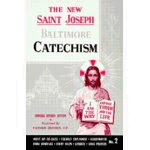
“When we elect our lawmakers in America, we
influence the moral character of this nation for better or for worse. When our laws permit violence against little
babies, incidents like the Columbine High School shootings are the logical outcome
…”
Rev. Frank Pavone, National Priests
for Life
|

The New Saint Joseph Baltimore Catechism (Official Baltimore Catechism
Series No. 2) Revised Edition
Order
securely online
This Catechism retains the text of the Revised Baltimore Catechism,
Number 2, but adds abundant explanations to help children understand the difficult parts
of each lesson along with pictures to aid in understanding.
Intended for grades 6-8
Official
Baltimore Catechism Series No. 1
is also available
Click Here
| |
|
Popular translations of the Gospels and of the Bible have been found
in Spanish, Italian, Danish, French, Norwegian, Polish, Bohemian, and Hungarian that
predate the reformation.
John Wycliff has been credited with the first English bible it 1382
but this is not true. Caedmon, a monk of Whitby in the seventh century translated great
portions of the Bible to the "common language." Venerable Bebe, a monk of Jarrow
died translating the Gospel of John in the 8th century. Eadhelm the Bishop of Sherborne,
Guthlec the hermit of Peterborough, and Egbert the Bishop of Holy Island all translated
the Good Book into the Saxon language in the eight century. Other early translators
included King Alfred the Great and Aelfric, the Archbishop of Canterbury. Early
translations included translated the Book of Durham; Rushworth Gloss, Paraphrase of Orm
(1150); Salus Animae (1250).
Thomas Moore, the Lord Chancellor of England during King Henry VIII's
reign says, "the whole Bible long before Wycliff's day was by virtuous and well
learned men translated into the English tongue, and by good and godly people with devotion
and soberness well and reverently read" (Dialogues III) and "the Clergy keep no
Bibles from the laity but such translations as be either not yet approved for good, or
such as be already reproved for naught as Wycliff's was. For, as for old ones that were
before Wycliff's days, they remain lawful and be in some folk's hand. I myself have seen,
and can show you, Bibles, fair and old, which have been known and seen by the bishop of
the diocese, and left in layman's hands and women's too, such as he knew for good and
Catholic folk, that used them with soberness and devotion." |

|
|
The Navarre Bible, an edition of Sacred Scripture prepared by members of the
Faculty of Theology of Navarre University, consists of the New Vulgate, the Revised
Standard Version, and commentaries. The commentaries provide explanations of the doctrinal
and practical meaning of the scriptural text, drawing on a rich variety of sources--Church
documents, the exegesis of Fathers and Doctors, and the works of prominent spiritual
writers, particularly the Venerable J. Escriva, who initiated the Navarre Bible project.
- Acts
of the Apostles: Navarre Bible $14.95
- Captivity
Epistles: Navarre Bible $14.95
- Catholic
Epistles: Navarre Bible $14.95
- Corinthians:
Navarre Bible
$14.95
- Hebrews:
Navarre Bible
$14.95
- Pentateuch:
Navarre Bible
$39.95
- Revelation:
Navarre Bible
$14.95
- Romans
and Galatians: Navarre Bible
$14.95
- St.
John: Navarre Bible
$14.95
- St.
Luke: Navarre Bible
$14.95
- St.
Mark: Navarre Bible
$14.95
- St.
Matthew: Navarre Bible
$14.95
- Thessalonians
and Pastoral Epistles: Navarre Bible
$14.95
|
|
Martin Luther's first bible appeared, 1520
104 Catholic translations existed in Latin
9 Catholic editions in German existed before his birth
27 Catholic editions in German existed before he published his (these
were exhibited at the Caxtor Exhibition in London in 1877)
First Italian Catholic version was 1471; 40 editions by 1520, 25 of
which were approved by Rome
First French Catholic version 1478; 18 editions by 1520
Spain began publishing Catholic Bibles in Spanish in 1478
Catholic Bibles Hungary in 1456
Catholic Bibles Bohemia in 1478
Catholic Bibles Flanders in 1500
In total 626 editions of the Catholic Bibles in 198 languages, at the
sanction of the Church, existed before the first protestant Bible appeared.
The first book ever printed on the printing press was 1456 and it was a
Catholic Bible under the authority of Cardinal Mazarin (Catholic) called the Mazarin Bible
(the press was invented in 1450)
|

|
Write to
Abell Apologetics at:
webmaster@chooselife.faithweb.com |

|
This Page last updated: Tuesday, October 31, 2000
4219 people have visited this page
|